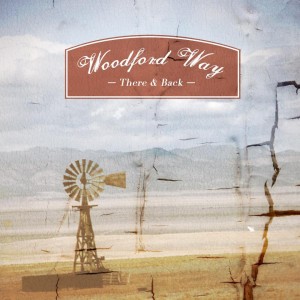 Woodford Way have released their first full length album as a full band. There & Back offers ten tracks of mellow electric-acoustic guitar driven songs that combine the best of singer-songwriter material with solid, full band musicianship.
Woodford Way have released their first full length album as a full band. There & Back offers ten tracks of mellow electric-acoustic guitar driven songs that combine the best of singer-songwriter material with solid, full band musicianship.
Singer-songwriter Kyle Mangini sings with the smoothest male timbre this side of the Mississippi. Mangini has a masterful control over the colors and tones in his voice as he coats each of his songs with his blissful croon. There is as much purity in his vocal applications as there is honesty in his lyrics. Guitarist Jeff Lynch press out a wide, sometimes edgy, electric phrase that always flows as smooth as Mangini’s voice with a sound as clean and clear as running water.
Woodford Way open this new disc with the gentle strumming movements of “Karen,” a brief ditty about a woman that somebody has moved on from but with a call to remember better times. It’s uncanny how tenderly Mangini sings it, and it’s also uncanny how well his band mates gel around him to widen its carefree warm vibe. Percussionist Tim Lynch must also be credited for creating a bracing, alluring rhythm behind the whole work.
“Ground Crew” shows what Woodford Way can do with a good drummer, Riley Godlelski, injecting a rolling, winsome rhythm for the boys to sing and strum over. Guitarist Jeff Lynch launches into a feisty melodic phrase here and keeps it tasteful and never overbearing as others do when they flash. “Ground Crew” is just a fun song to tap your toes or bob your head to as it traipses its way along a jaunty pace.
“Harpoon” is a hip confection of subtle percussion, mild organ swirls, and adept drumming. The boys serve up an infectious groove with bass player Eric Arena plucking some knobby low end textures within his movable flow. The quirky rhythm gives Mangini a lively, movable platform to toss off his amiable delivery. It would be impossible to have a bad day if this song is the first thing you heard in the morning.
“Ruby” breezes along like a feather in a majestic summer wind. Its vocal and acoustic guitar lines move along with an accessible lilting warmth. Mangini wraps his light, smooth croon around it like a fond embrace and the song becomes something you wish would last much longer than its time slot. Guitarist Jeff Lynch keeps his acoustic bouncy and catchy, and he inserts a sharper phrase on his electric for an appetizing song arc that only adds to the character of this pleasant ditty.
The boys travel more into blues-roots rock territory in “Couldn’t Be More Wrong.” The song travels a lyrical tale of woe and regret backed up with heart-felt, soulful vocals, bittersweet toned guitar phrases, mournful organ swirls and a punchy rhythm section that somehow make this all sound beautiful. There’s a high level of expression in this song, not only in the poignant vocal delivery but in the sharp guitar lines that penetrate the melancholy theme with tenderness and meaning.
“City Line” creates a mild funk vibe with a jumpy piano tackling the grooves with easeful authority. This one will make you want to dance, tap your toes, and snap your fingers all at once. Mangini gets hipper here as he finesses his way through his words, lifting his earthy croon over that perky, honky tonky piano.
The boys continue their earthy swagger on “Roll On Over,” a mellow bluesy, rootsy piece that finds Mangini applying his hip attitude to some twisty lyrical rhythms. Jeff Lynch’s nimble guitar work is the swinging daddy-o that dances over it all with graceful aplomb.
“Natural Rebound” returns the boys to their gentle acoustic alter-egos. Mangini takes his sweet time applying his easeful, tender tone to this ditty, a tune that just pulls you into his sweet memories. His just might be the most memorable singer-songwriter voice since John Denver. It’s a fine piece that reminds what can be done with a good melody without a lot of hard-charging music around it and when words and music connect with a listener’s heart.
The boys in Woodford Way are a bit restless on this disc, and they’re soon back in rock and roll territory with “The Race Is On.” This number serves up assertive guitar prowess, hefty slabs of organ groove, and a thumpy rhythm section. The boys do a fine job of keeping it at once rocking and meaningful. Woodford Way close out their album with the soft brush stroke of “Charlotte’s Lullaby,” a lone voice plaintively crooning over an understated acoustic guitar. The spare but solid performance leaves the listener with a powerful reminds that at the heart of this band there beats what could be a wellspring of great singer-songwriter material for years to come.
Woodford Way are onto something special here. Mangini’s voice, in all of the band’s tempos and styles, pulls the listener in with its clarity, tenderness, and warmth. The players around him provide agile support to songs that will surely remain with their listeners for sometime to come.

